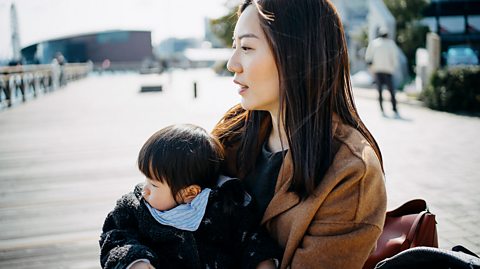Having a baby teaches you so much about your partner, says , a BACP-accredited psychotherapist, who works mainly with people in the early stages of parenthood.
ãItãs a period of learning so much, so quickly. It shows you things about your partner that you weren't aware of before. Some of these might be incredible, but you may also find differences.ã
Later in the article you can read about how three real parents found ways to nurture their relationships, but first Sarah has some relationship tips to share.

1. Learn to see challenges as opportunities
Draw comfort from the fact itãs completely normal to feel strain in your relationship. ãEspecially at the beginning, it can feel like you're hit with a variety of new experiences and emotions, and donãt have the words to explain them to your partner,ã says Sarah.
ãBut thereãs a lot to be said for seeing the challenges as growth opportunities. Becoming parents highlights parts of your relationship that you could pretend werenãt there before. But if you learn how to navigate these and adapt, it will strengthen your bond.ã
Remember youãre a team. ãIf you can look after each other and the sense of yourselves as a couple, it will benefit your baby. Because when your relationship thrives, youãre both more able to support your babyãs development,ã adds Sarah.
2. Communicate well and argue better
Great communication is key to reconnecting, but so is being good at disagreeing and repairing things, says Sarah.
ãThis doesn't mean avoiding the other person, shutting them down, or criticising them. It means backing down sometimes, retreating so you can calm down and thinking: ãI would rather be in a relationship than be right in this argumentã.
Sarah suggests having a safe word as a couple. Whatever they choose, ãIt means ãthis conversation ends right now ã we can come back to it when we're both in a better stateã.ã
3. Try low-key intimacy
ãYour heart might sink at the thought of organising a date night because itãs too much to deal with,ã says Sarah. But you can show your desire for connection in smaller ways.
ãIt can be as simple as sitting next to each other watching box sets, knees touching or just holding hands. Even if you donãt have the energy to speak, youãre showing your partner that you want to connect.ã
There are no set rules about when to have sex again, it depends when youãre physically and emotionally ready. Take your time and talk about what it means to you both. You might discover you have differing views but airing them is better than letting resentment build up, Sarah explains.
4. Be honest about difficult emotions and topics
Whether you feel overwhelmed by chores, or you disagree with your partnerãs parenting style, donãt let it simmer.
ãI see many new parents trying to protect their partners ã for instance, protecting their sleep or hiding financial worries,ã says Sarah.
ãBut shielding them from difficult emotions stores things up and thatãs not healthy. You might think youãre being thoughtful but youãre disconnecting rather than enabling your connection.ã

5. Reclaim some me-time (without judgement)
Easier said than done, but scheduling in slivers of free time for you and your partner to do stuff you enjoy can be refreshing. ãSometimes your partner might choose a certain activity that you donãt see as a good use of time,ã says Sarah. ãTry to avoid these value judgements. If they want to game for an hour or go shopping, thatãs up to them.ã
6. Focus inward
Itãs natural to compare yourselves to other new parents, but your energy is best focused on nurturing your relationship.
You only see what you want to see and what people want to show you, particularly on social media says Sarah.
ãRemember parents on social media are people who feel able to present themselves. Theyãre a very small percentage of the population, and thereãs a huge mass of other parents at home, getting on with life.ã
7. Donãt be afraid to ask for help
ãKnowing when to do this is individual to you ã there are no indicators that apply to everyone,ã says Sarah. ãBut you might feel as though you have either tried and failed to have conversations with your partner, or youãre not sure how to start talking or you're feeling scared.ã
Speak to your GP or health visitor who might be able to signpost you to support, or turn to someone you both trust, adds Sarah. ãSomebody who believes in your relationship and genuinely wants the best for you both.ã
What worked for us ã relationship tips from parents
ãBe patient and be kindã - Lindsey
Lindsey has a 3-year-old daughter Ellie with partner Dan, and a stepdaughter Kaitlin, 14.
ãThe period after Ellieãs birth was a whirlwind of emotions. On top of the usual challenges like exhaustion, it was lockdown, and we didnãt have any family close by. We couldnãt do the things we used to enjoy as a couple. Even going for a dog walk was impossible.
ãSlowly we found a way through. At first, it was about finding little pockets of time, something as simple as a coffee together. It gave us the chance to relax and check in to see how each other was doing and chat about things other than parenting.
ãOver time, we got support from friends, family, and social groups. And we had the chance to organise date nights and do activities on our own, like exercising, again. Through the highs and lows, our relationship changed in lots of positive ways.
ãMy advice is to be patient and kind to each other. Make time to reconnect, even if itãs brief to start with. Don't compare yourself to others. Itãs natural to think everyone else has got it sorted. But itãs different for everyone.
ãHold on to the moments of fun and laughter as your child grows. And be honest ã know that itãs fine to say when youãre struggling.ã
Not every day is wonderful and beautiful, and thatãs alright.

ãFind small ways to bondã - Amy
Amy has two sons under 4 with her partner Paul.
ãI didnãt have any idea how much our first baby would change our relationship. I assumed we'd carry on having fun, getting on brilliantly, but with a cute little baby. But I had a traumatic birth, our baby didn't sleep, it was lockdown, my hormones were all over the place and it put a strain on us.
ãI think going through what my friend calls ãthe swamp yearsã can pull you closer together. You remember how much you like each other, especially once you start getting more sleep. I have a deeper respect and admiration for my partner than ever before. I love seeing what a great parent he is.
Don't take anything said in the middle of the night or when youãre sleep-deprived to heart.
ãIf my partner wants to start a conversation about something serious when I'm too exhausted, I ask him to wait, even if it means emailing me on his commute to work.
ãTry to keep a sense of humour and find small ways to reconnect. Even having a takeaway or glass of wine while you fold laundry can be lovely.
ãIt's important that you both do something you enjoy, whether on your own, with friends or in a group. It reminds you that you're still a person in your own right ã not just a parent ã and it's a chance to decompress.ã
ãHave a change of sceneã - Antony
Antony and his partner have a 2-year-old son.
ãIn the early days, itãs hard to be the way you were as a couple before your baby came along.
The big thing for us was we couldnãt be spontaneous and carefree.
ãThere are phases of parenting, and thatãs also true for relationships, they develop too. Itãs important to take time to listen and check in with each other but becoming a better communicator is a learning process. One thing we found useful was taking five minutes after weãd put him to bed just to talk and say, ãHow are you today, how was your day?ã.
ãAccept support from your family and friends so you can have a change of scene. It can be quite an effort to get out of the house otherwise. We find walks together are a great way to reconnect. And when youãre walking side by side, not facing each other, it also seems easier to talk about how youãre feeling too.
Remember the bigger picture ã raising a child together is an amazing thing. We have seen new sides of each other as parents as well as partners, and thatãs really powerful.






